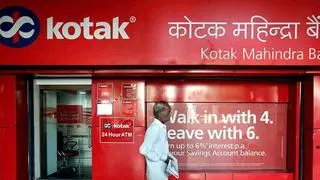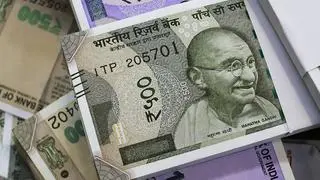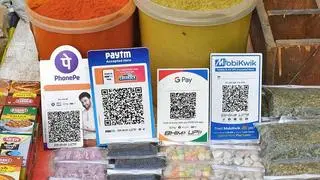Major bank employee unions in a letter to the India Banks' Association (IBA) have said that total chaos prevails at bank branches handling the exchange of demonetised notes.
In a letter to the IBA Chairman, S Nagarajan and C.H. Venkatachalam, General-Secretaries of the All-India Bank Officers’ Association (AIBOA) and the All-India Bank Employees’ Association (AIBEA), said the situation was unbearable for both customers and the general public as well as for bank officers and employees .
TENSION IN BRANCHES
Rs 100 notes are in dire shortage, the leaders said, adding that there is tension in the branches as customers and the general public prefer Rs 100 notes for routine consumption needs.
“The Centre and the Reserve Bank must be fully aware that already there is a huge gap between the indent and supply of Rs 100 notes.”
For example, in 2015-16, as against the indent of 535 crore pieces of Rs 100 notes, the supply received was only to the tune of 490 crore pieces.
Even now, the new Rs 500 notes had not been issued by RBI or received at the bank branches or currency chests.
One could not understand the reason behind banning the existing Rs 500 notes and not providing new supply of Rs 500 notes in time, they said.
Not all customers preferred Rs 2,000 notes. This was causing friction and arguments between customers and staff as though the latter were deliberately pushing the Rs 2,000 notes.
PM GREETS STAFF
The bank staff have risen to the occasion and have out-performed their duties for the past four days, overlooking their physical limitations. Even the Prime Minister has complimented and congratulated them for the extraordinary work.
“While we do not wish to go into the merits or otherwise of the scheme in achieving the purposes for which it has been intended, we would definitely like to point out that it was done without proper preparedness,” the union leaders said.
It was announced that the ATMs would be ready to function from November 11, but the reality is that most of them are closed or non-functional or partly functional.
This has put additional pressure on the staff, since customers are compelled to approach branches to draw cash from their accounts.
It is now being said it may take another three weeks for the ATMs to work normally. This is also doubtful because the existing two lakh ATMs are in various locations, including about 35,000 in far-flung areas.
SOFTWARE CHANGE
The ATMs need to be recalibrated with proper trays to accommodate the new Rs 2,000 and Rs 500 notes, which are of different sizes.
The software may also require some changes. With acute shortage of Rs 100 notes, the ATMs are likely to be dead machines for quite some time, which would add to the ire of the people. This anger was bound to be directed at the branch staff, making their life further miserable.
Already, officers and employees in the branches have faced the brunt with patience and commitment to duty.
“Matched only by an admirable sense of social responsibility to the people at large, they have undertaken the job unmindful of physical fatigue and mental exhaustion.
“They have worked beyond their normally expected capacity, depriving themselves of even minimum conveniences such as lunch and have sat late into the night in many branches. The pressure has been singularly heavy on the staff directly handling cash and currency chest,” they said.
HEALTH HAZARD
The presence of heavy crowds in bank branches for long hours from morning till late evening, has posed a health hazard for all concerned.
“There are reports of senior citizen customers fainting in the premises and employees falling sick. We need not overstate these difficulties as these can only be imagined,” the union leaders pointed out.
Branches also have just enough staff strength and even a shortage of staff, and this sudden deluge of people milling around the branches has taken a heavy toll on the staff.
This experience has underscored the need to have buffer staff in the branches for any such contingencies.
Staff and officers were also facing IT-related issues with computers hanging on occasion. When the counters have to be closed for want of cash or when computers were down, they have been subjected to physical attacks and abuses hurled at them, including lady staff.
This has demoralised the workforce, particularly the young employees and officers who have joined the banks in recent years.
TRAUMATIC EXPERIENCE
A few of them have even contacted the union leadership to say that they would like to resign their jobs. It has been a traumatic experience for many since working for long hours in such difficult circumstances has resulted in unimaginable stress and strain.
Meanwhile, a few bank managements have issued instructions for payment of overtime wages for the award staff, while others have offered compensation to officers.
While their suffering has been uniform, the compensation is not uniform. It was expected that the IBA would advise all banks to follow some common guidelines, the union leaders said.
Asking the staff to come early and work late for exigencies is understandable but it has its physical limitations. Staff cannot be expected to work long hours for days together, even foregoing their holidays.
It appears that the situation may continue for a longer period as most ATMs are not likely to work in full swing for the next few weeks and the pressure of work in the branches will continue.
Given this, the AIBEA and AIBOA have made a list of suggestions seeking the intervention of the RBI and the government in the matter:
SUGGESTIONS
1. The RBI/ Centre should be approached to allow all government departments, agencies and institutions to exchange the banned Rs 500/ 1,000 notes in addition to banks and post-offices.
2. RBI should immediately ensure adequate supply of cash in denominations of Rs 100 and the new Rs 500 notes.
3. ATMs should be recalibrated on top priority and made ready for use within the shortest possible time.
4. Extra business hours can be implemented where required, but staff should be deployed on shift basis; and no person should work continuously for long hours.
5. Where employees/ officers are required to work late hours, arrangements for conveyance and food should be ensured.
6. IBA should send uniform instructions to all banks on payment of overtime wages/ compensation amount.
7. For the work done in the last few days, instructions should be given to ensure payment along with this month’s salary.
8. Banks should take special care while seeking services of lady employees/ officers during late hours.
9. Additional infrastructure such as computer terminals should be provided. Separate arrangements to be made to handle senior citizens.
10. Additional machines need to be provided for branches handling heavy cash to detect fake notes as the problem is getting aggravated in the current circumstances.








Comments
Comments have to be in English, and in full sentences. They cannot be abusive or personal. Please abide by our community guidelines for posting your comments.
We have migrated to a new commenting platform. If you are already a registered user of TheHindu Businessline and logged in, you may continue to engage with our articles. If you do not have an account please register and login to post comments. Users can access their older comments by logging into their accounts on Vuukle.